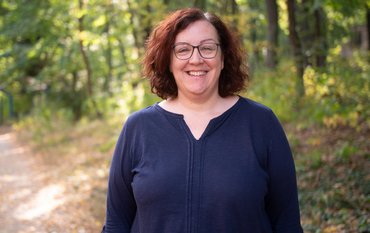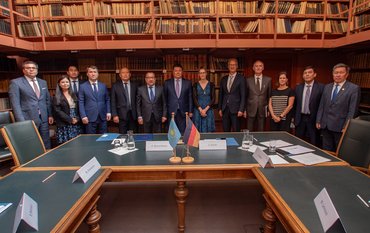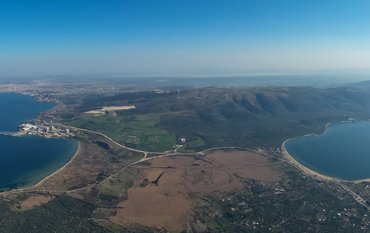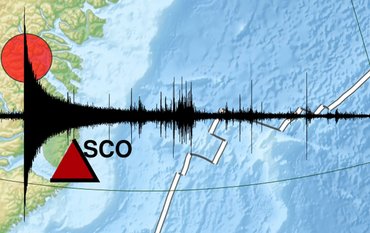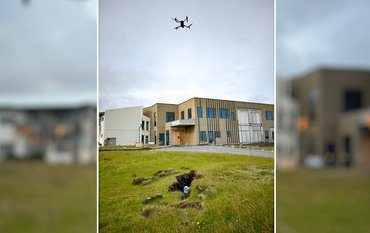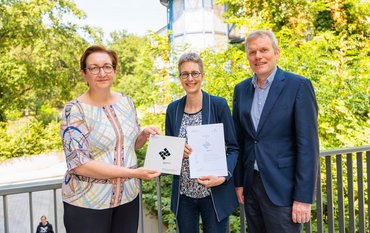Judith Pirscher, State Secretary at the Federal Ministry of Education and Research (BMBF), visited the Telegrafenberg in Potsdam last week to learn about the work of the GFZ German Research Centre for Geosciences. The State Secretary was welcomed by the Scientific Director of the GFZ, Susanne Buiter, and the Administrative Director of the GFZ, Stefan Schwartze.
Susanne Buiter gave an overview of the research centre with its infrastructures and regional and global observatories. A focus was on the GFZ satellite missions, including GRACE-FO and the successor mission currently in preparation, as well as EnMAP, which contribute to global climate and environmental monitoring respectively. She also presented the services that the GFZ operates for the observation and possible early warning of earthquakes – the Geofon network for real-time seismic data and a new earthquake risk map of Europe.
State Secretary Pirscher was also very interested in a demonstrator project for storing hydrogen underground, which the GFZ would like to realise in Brandenburg - an important contribution to the energy transition.
Magdalena Scheck-Wenderoth, Director of Department 4 “Geosystems”, outlined current and future research questions on the topic of geothermal energy and highlighted the potential that the utilisation of deep geothermal energy in particular has in Germany for a regenerative energy supply.
The new Director of Department 1 “Geodesy”, Maik Thomas, presented an infrastructure project that envisages the use of data cables on the seabed for monitoring oceans and recording seismic signals.
André Kloth, Managing Director of DiGOS, the most successful spin-off from the GFZ, demonstrated that the GFZ not only conducts relevant basic and applied research, but can also translate important developments into commercial products and services. The company, which now has 40 employees, develops laser ground stations that can be used to determine the distances and trajectories of satellites and space debris with high precision.
During a subsequent laboratory visit to the GFZ's high-pressure hall, Juliane Kummerow provided insights into current issues and experiments on underground hydrogen storage.
The Scientific Director of the GFZ, Susanne Buiter, thanked State Secretary Pirscher for the open and constructive exchange and said:
“The mutual exchange at our premises on the Telegrafenberg has shown us many points of contact for the future research agenda of the GFZ. We were able to give State Secretary Pirscher a comprehensive overview of the diverse research topics at the GFZ and show that we are working on important topics for the future – from geothermal energy to our satellite missions and the storage of hydrogen underground. In this way, we are making an important contribution to the upcoming economic and social transformation processes and providing scientifically sound support for political decision-making processes.”
Following her visit to the GFZ, Judith Pirscher continued her programme at the Helmholtz sister institute of the GFZ, the Alfred Wegener Institute for Polar and Marine Research (AWI), and at the Potsdam Institute for Climate Impact Research (PIK).





![[Translate to English:] [Translate to English:] Abror Gafurov von dem Schriftzug "Welcome to Azerbaijan" und den UN und COP Logos](/fileadmin/_processed_/2/5/csm_2024_11_Baku_COP29_Abror_Gafurov_1042faec82.jpeg)



![[Translate to English:] Martin Herold standing in front of the library on the Telegrafenberg](/fileadmin/_processed_/c/d/csm_Martin_Herold_d385ee4dd9.jpeg)
![[Translate to English:] Many people are listening to a presentation in the GFZ lecture hall.](/fileadmin/_processed_/c/a/csm_1_Bild1_hell_b9c0e9f5ed.jpeg)





![[Translate to English:] Both scientists sitting on stools in front of a wall of books in the Telegrafenberg library](/fileadmin/_processed_/6/6/csm_Buiter_Castell_DORA_4_e87cb1ea18.jpeg)
![[Translate to English:] Gruppenbild mit 4 Personen](/fileadmin/_processed_/8/d/csm_20241017_GFZ-Emmerman-Medal-005_web_reinhardtundsommer_21a414fa4a.jpeg)






![[Translate to English:] Ice landscape with five red tents](/fileadmin/_processed_/8/9/csm_Zeltlager_auf_dem_Eis_Urheberin_Jenine_McCutcheon_5ced2d523b.jpeg)


